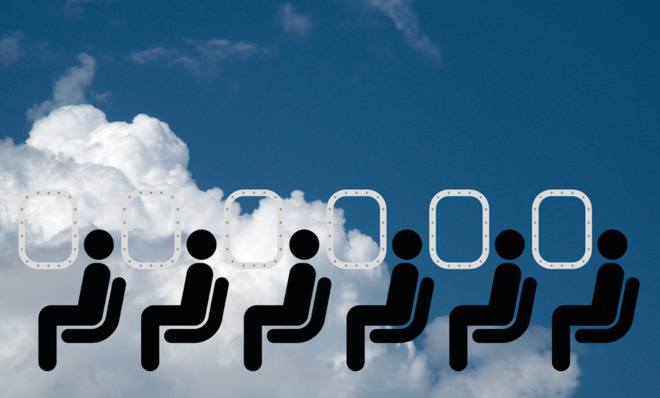Please obey this simple rule for airplane seat reclining
Just because you have the right to recline doesn't mean it's always the right thing to do


A free daily email with the biggest news stories of the day – and the best features from TheWeek.com
You are now subscribed
Your newsletter sign-up was successful
There's no surer way to turn a formerly civil group of adults into two bitterly divided, frothing, seething camps than to bring up the topic of airline seat reclining. Imagine what it would look like if the cast of Fox News got stuck in an elevator with the MSNBC crew. Things get ugly, and fast.
All because of four inches of space. My iPhone is longer than that. So why do those four inches become so important at 30,000 feet?
There are a couple of reasons. The first is physical. To stay solvent, airlines have, over the years, reduced the space between economy seats, but have not removed those seats' capacity to recline. (The exception is a small handful of budget carriers.) Therefore, a reclined seat 6A might very well thrust a tray-table with a meal or laptop on it smack into the abdomen of the passenger in 7A. If 7A happens to be taller than five-foot-eleven or so, the reclined seat actually presses into his or her knees. From personal experience, I can tell you, it does not feel good.
The Week
Escape your echo chamber. Get the facts behind the news, plus analysis from multiple perspectives.

Sign up for The Week's Free Newsletters
From our morning news briefing to a weekly Good News Newsletter, get the best of The Week delivered directly to your inbox.
From our morning news briefing to a weekly Good News Newsletter, get the best of The Week delivered directly to your inbox.
The second reason for the Great Reclining Controversy is psychological. We humans are possessive creatures. If I am given something, and someone tries to take it away, my first instinct is to fight to keep it. This is why people actually risk their lives by struggling with an armed assailant over a purse or wallet with relatively little of value in it. In the case of the airline seat, you have two people who have paid for something and think of it as theirs: 6A has a recline button (and therefore a perceived right to recline) and 7A has about 10 to 12 inches of air in which to function while aloft. He considers that space his own for the duration of the flight.
Conflict seems inevitable. If 6A reclines, she has taken away 7A's perceived right to use the space for which he has paid. If 7A uses a Knee Defender or even (as I have seen done) his own legs to prevent 6A from reclining, then he has taken away something to which she believes she is entitled. Next thing you know, drinks are being thrown and the pilot is making an unscheduled stop in Omaha.
But wait. We humans are more than our base instincts. We also have the ability to modify our actions and expectations based on changing scenarios. Sure, 6A has a recline button on her seat. And yes, 7A has paid for a seat with space enough to move and breathe. They have a right to enjoy those amenities. However, there are certain situations when a "right" just isn't right.
The first amendment gives me the right to speak freely, and I will confess to using a little salty language on occasion. It would not, however, be at all correct or good for me to drop the f-bomb in front of someone I know would be deeply offended by it. It would therefore be wrong of me to exercise my right to curse like a sailor until I am home alone with my husband, who thinks it's endearing.
A free daily email with the biggest news stories of the day – and the best features from TheWeek.com
Similarly, if 7A is six-foot-three and there are no roomier seats to which a flight attendant might move him, then 6A would be kind and right not to exercise her "right" to recline. By the same token, if 7A is of more average height, and not in the middle of eating a meal or enjoying a cocktail, then it would be churlish for him to complain about 6A wanting to be more comfortable, especially on a longer or night flight.
A little observation, good judgment, and communication go a long way.
I know it's hard. By the time we all get through the indignity of taking off our shoes and having our carry-ons searched, after we've been herded through the gate and forced to wait for each other to get settled, we feel powerless and imposed-upon. It's hard not to use the last vestige of power and control we feel we have to take ownership of our airline seats and the space around them.
But we humans, in addition to being possessive, also have a unique aptitude for empathy and kindness. Think about the situation not in terms of having something taken away from you on an airplane; think of yourself as giving your fellow passenger some comfort by shifting your laptop and allowing her to recline, or giving him much-needed leg room by only partially reclining your seat, and doing it slowly and only after a heads-up. ("I'm going to recline just a little for a much-needed nap; wanted to let you know.")
Giving begets gratitude, and good feelings, and we could all use a little more of those … especially as the season of thanks and giving always seems to involve (you got it) more travel.
Leslie Turnbull is a Harvard-educated anthropologist with over 20 years' experience as a development officer and consultant. She cares for three children, two dogs, and one husband. When not sticking her nose into other peoples' business, she enjoys surfing, cooking, and writing (often bad) poetry.
-
 Regent Hong Kong: a tranquil haven with a prime waterfront spot
Regent Hong Kong: a tranquil haven with a prime waterfront spotThe Week Recommends The trendy hotel recently underwent an extensive two-year revamp
-
 The problem with diagnosing profound autism
The problem with diagnosing profound autismThe Explainer Experts are reconsidering the idea of autism as a spectrum, which could impact diagnoses and policy making for the condition
-
 What to know before filing your own taxes for the first time
What to know before filing your own taxes for the first timethe explainer Tackle this financial milestone with confidence
